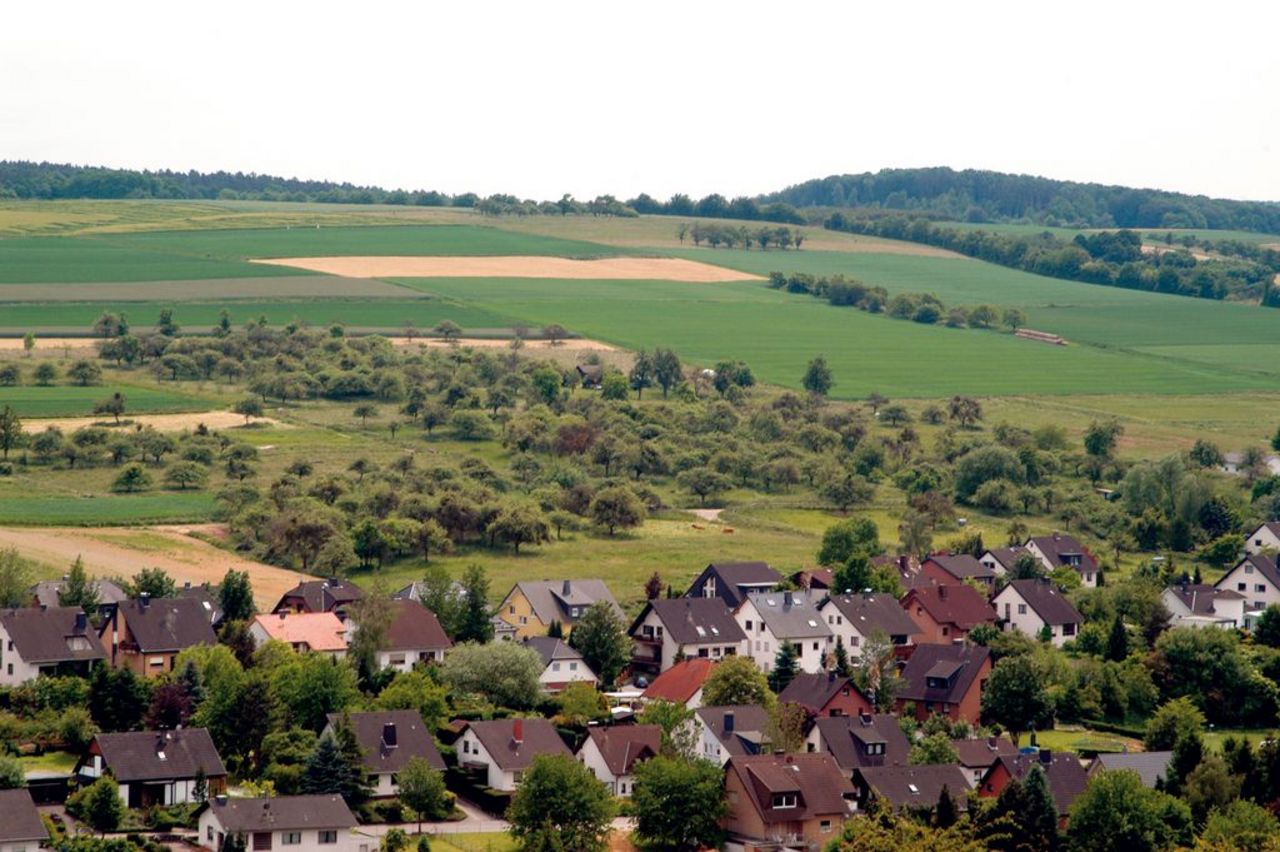Project
Interdependencies between Land use and Climate Change - Strategies for a sustainable land use management in Germany (CC-LandStraD)

Land resources are limited in Germany and many other regions of the world, land use claims compete. Climate change and the globalisation of economies aggravate the competition. To what extent environmental protection, climate mitigation, and sustainable resource management can be satisfied is the concern of the research in the collaborative project CC-LandStraD.
Background and Objective
Germany is located in the temperate zone. It covers an area of about 357.000 km2, has approximately 82 million inhabitants, and thus ranks among the most densely populated countries worldwide. Since only little area is available the land is intensively used and the social demands are manifold. In 2009 agriculture used about 52 % and forestry about 30 % of the area in Germany. However, the land use for settlements and transport infrastructure as well as for recreation has a high priority. Currently, its share accounts for approximately 14 % of total area. The development of the area for settlements and transport infrastructure essentially determines how much area remains for the production of food feed and wood. The cultivations should as much as possible comply with environmental and nature protection such that several ecosystem services preserve their stability.
In the past expectation arose that land use and land use change should contribute to climate mitigation. For example, an adapted land use management may preserve or even increase the carbon pool in soils and the vegetation. A further option is to substitute energy produced from fossil resources for bioenergy. The potential contribution of land management to climate mitigation hinges upon complex interrelations between land use changes and the bio-geosphere, which however, are partly not yet resolved.
The objective of the collaborative projected CC-LandStraD is to model the interrelations between land use, climate change and natural processes to assess the contribution of different strategies and systems of land use to climate mitigation and energy supply across sectors and area wide for Germany. Furthermore, the impacts of the resulting land use changes will be assessed taking the feasibility and social acceptance of the strategies into account.
Target Group
policy, administration, special interest groups
Approach
The collaborative project comprises four modules including the coordination. All modules are interlinked to analyse the outlined research questions and objectives. The modules are as follows:
- Development of scenarios and strategies of land management together with stake holders,
- Integrated climate, biophysical, and socioeconomic modelling – across land use sectors, area wide and regional differentiated,
- Assessment of climate, ecological and socioeconomic impacts of different land use options,
- Exemplary testing of the feasibility and social acceptance of land use options in study regions.
Data and Methods
We apply interdisciplinary and transdisciplinary methods and develop natural science and economic models further.
Our Research Questions
"What is the contribution of land use to climate mitigation in Germany under changing framework conditions?
Which regional land use strategies can be derived across land use sectors to achieve climate mitigation targets?
How can different requirements towards land use be settled?"
Results
According to the interdisciplinary and transdisciplinary research approach of CC-LandStraD a diversity of results compiled:
- cross sector land use scenarios for Germany agreed upon with stake holders within an iterative process
- further developed modelling of relationships between land use, climate change, and natural process
- model based impact analyses of land use strategies under changing global framework conditions (e.g. climate change, market developments)
- description of existing conflicts of objectives between climate optimised land use strategies and other social demands
- quantification of social preferences of land use strategies
- proposition of climate mitigation aspects in decision and change processes.
The results of the joint project are listed in the publications. We would particularly like to highlight the reference book "Wechselwirkungen zwischen Landnutzung und Klimawandel". Open Access-Download: Wechselwirkungen zwischen Landnutzung und Klimawandel | SpringerLink
Links and Downloads
Thünen-Contact

Involved Thünen-Partners
- Baum, SarahLV Institute of Rural Studies
- Dechow, ReneAK Institute of Climate-Smart Agriculture
- Elsasser, Peter WF Institute of Forestry
- Gömann, HorstLR Institute of Rural Studies
- Hellmich, MeikeLR Institute of Rural Studies
- Klimek, SebastianBD Institute of Biodiversity
- Kreins, PeterLV Institute of Rural Studies
- Steinführer, AnnettLV Institute of Rural Studies
- Weingarten, PeterLV Institute of Rural Studies
Involved external Thünen-Partners
- Bundesinstitut für Bau-, Stadt- und Raumforschung (BBSR)
(Bonn, Deutschland) - Institut für ökologische Wirtschaftsforschung (IÖW)
(Berlin, Deutschland) - Potsdam-Institut für Klimafolgenforschung (PIK)
(Potsdam, Deutschland) -
Westfälische Wilhelms-Universität (WWU)
(Münster, Deutschland) - Leibniz-Zentrum für Agrarlandschaftsforschung (ZALF) e.V.
(Müncheberg, Deutschland)
Publications to the project
- 0
Baum S, Elsasser P, Ermisch N, Goetzke R, Henseler M, Hoymann J, Kreins P, Weller P (2021) Anhang. In: Gömann H, Fick J (eds) Wechselwirkungen zwischen Landnutzung und Klimawandel. Wiesbaden: Springer Spektrum, pp 435-457, DOI:10.1007/978-3-658-18671-5_7
- 1
Gömann H, Fick J (2021) Einführung. In: Gömann H, Fick J (eds) Wechselwirkungen zwischen Landnutzung und Klimawandel. Wiesbaden: Springer Spektrum, pp 1-19, DOI:10.1007/978-3-658-18671-5_1
- 2
Elsasser P, Grabski-Kieron U, Hellmich M, Hirschfeld J, Raabe M, Rajmis S, Sagebiel J, Siebert R, Steinführer A, Steinhäußer R, Weller P (2021) Gesellschaftliche Bewertung der Landnutzungsstrategien. In: Gömann H, Fick J (eds) Wechselwirkungen zwischen Landnutzung und Klimawandel. Wiesbaden: Springer Spektrum, pp 299-420, DOI:10.1007/978-3-658-18671-5_5
- 3
Baum S, Elsasser P, Goetzke R, Henseler M, Hoymann J, Kreins P (2021) Handlungsfelder der Landnutzung. In: Gömann H, Fick J (eds) Wechselwirkungen zwischen Landnutzung und Klimawandel. Wiesbaden: Springer Spektrum, pp 72-141, DOI:10.1007/978-3-658-18671-5_3
- 4
Hoymann J, Baum S, Elsasser P, Dechow R, Gutsch M, Fick J (2021) Ist-Situation der Landnutzung in Deutschland. In: Gömann H, Fick J (eds) Wechselwirkungen zwischen Landnutzung und Klimawandel. Wiesbaden: Springer Spektrum, pp 21-70, DOI:10.1007/978-3-658-18671-5_2
- 5
Steinführer A, Hellmich M, Siebert R, Steinhäußer R (2021) Landnutzung und Klimawandel im transdisziplinären Diskurs: Wissenschaft und Stakeholder in Interaktion. In: Gömann H, Fick J (eds) Wechselwirkungen zwischen Landnutzung und Klimawandel. Wiesbaden: Springer Spektrum, pp 375-420
- 6
Baum S, Conradt T, Dechow R, Elsasser P, Englert H, Ermisch N, Gömann H, Goetzke R, Gottschalk P, Gutsch M, Henseler M, Hoymann J, Köthke M, Kreins P, Lasch-Born P, Suckow F, Wechsung F (2021) Modellgestützte Wirkungsanalysen ausgewählter Maßnahmen und Strategien. In: Gömann H, Fick J (eds) Wechselwirkungen zwischen Landnutzung und Klimawandel. Wiesbaden: Springer Spektrum, pp 143-297, DOI:10.1007/978-3-658-18671-5_4
- 7
Gömann H, Fick J (2021) Zusammenfassende Schlussbetrachtung. In: Gömann H, Fick J (eds) Wechselwirkungen zwischen Landnutzung und Klimawandel. Wiesbaden: Springer Spektrum, pp 421-434, DOI:10.1007/978-3-658-18671-5_6
- 8
Henseler M, Delzeit R, Adenäuer M, Baum S, Kreins P (2020) Nitrogen tax and set-aside as greenhouse gas abatement policies under global change scenarios: A case study for Germany. Environ Resource Econ 76:299-329, DOI:10.1007/s10640-021-00573-x
- 9
Weller P, Elsasser P (2018) Preferences for forest structural attributes in Germany - Evidence from a choice experiment. Forest Pol Econ 93:1-9, DOI:10.1016/j.forpol.2018.04.013
- 10
Baum S, Röder N, Henseler M, Kreins P (2017) Adapted management of organic soils. In: Liniger H, Mekdaschi Studer R, Moll P, Zander U (eds) Making sense of research for sustainable land management. Bern: Univ Bern, pp 203-206
- 11
Fick J, Baum S, Dechow R, Goetzke R, Grabski-Kieron U, Hellmich M, Henseler M, Hoymann J, Kreins P, Raabe M, Röder N, Siebert R, Steinführer A (2017) Climate change mitigation in Germany: Optimizing conflicting demands. In: Liniger H, Mekdaschi Studer R, Moll P, Zander U (eds) Making sense of research for sustainable land management. Bern: Univ Bern, pp 79-81
- 12
Bösch M, Elsasser P, Rock J, Rüter S, Weimar H, Dieter M (2017) Costs and carbon sequestration potential of alternative forest management measures in Germany. Forest Pol Econ 78:88-97, DOI:10.1016/j.forpol.2017.01.005
- 13
Baum S, Röder N, Henseler M, Kreins P (2017) Grassland preservation. In: Liniger H, Mekdaschi Studer R, Moll P, Zander U (eds) Making sense of research for sustainable land management. Bern: Univ Bern, pp 207-210
- 14
Baum S, Röder N, Henseler M, Kreins P (2017) Grassland preservation and extensive use in Germany. In: Liniger H, Mekdaschi Studer R, Moll P, Zander U (eds) Making sense of research for sustainable land management. Bern: Univ Bern, pp 84-85
- 15
Fick J, Steinführer A, Hellmich M, Siebert R (2017) Open dialogue platform on sustainable land management. In: Liniger H, Mekdaschi Studer R, Moll P, Zander U (eds) Making sense of research for sustainable land management. Bern: Univ Bern, pp 211-214
- 16
Oehlmann M, Meyerhoff J, Mariel P, Weller P (2017) Uncovering context-induced status quo effects in choice experiments. J Environ Econ Manag 81:59-73, DOI:10.1016/j.jeem.2016.09.002
- 17
Fick J, Baum S, Dechow R, Elsasser P, Ermisch N, Gömann H, Grabski-Kieron U, Gutsch M, Hellmich M, Hirschfeld J, Hoymann J, Kreins P, Lasch-Born P, Raabe M, Sagebiel J, Steinführer A, Wechsung F, Weingarten P, Weller P, Gömann H (2016) CC-LandStraD : Climate Change - Land Use Strategies ; final report ; interdependencies between land use and climate change ; strategies for sustainable use management in Germany. Braunschweig: Johann Heinrich von Thünen-Institut
- 18
Fick J, Gömann H, Baum S, Dechow R, Elsasser P, Ermisch N, Goetzke R, Grabski-Kieron U, Gutsch M, Hellmich M, Henseler M, Hirschfeld J, Hoymann J, Kreins P, Lasch-Born P, Raabe M, Sagebiel J, Steinführer A, Weingarten P, Weller P, et al (2016) Wechselwirkungen zwischen Landnutzung und Klimawandel : Ausgewählte Ergebnisse des Forschungsvorhabens CC-LandstraD. Braunschweig: Johann Heinrich von Thünen-Institut, 73 p
- 19
Röder N, Henseler M, Liebersbach H, Kreins P, Osterburg B (2015) Evaluation of land use based greenhouse gas abatement measures in Germany. Ecol Econ 117:193-202, DOI:10.1016/j.ecolecon.2015.06.007
- 20
Steinhäußer R, Siebert R, Steinführer A, Hellmich M (2015) National and regional land-use conflicts in Germany from the perspective of stakeholders. Land Use Pol 49:183-194, DOI:10.1016/j.landusepol.2015.08.009
- 21
Meyerhoff J, Oehlmann M, Weller P (2015) The influence of design dimensions on stated choice in an environmental context. Environ Resource Econ 61(3):385-407, DOI:10.1007/s10640-014-9797-5
- 22
Henseler M, Röder N, Liebersbach H, Kreins P, Osterburg B (2015) The mitigation potential and cost efficiency of abatement-based payments for the production of short-rotation coppices in Germany. Biomass Bioenergy 81:592-601, DOI:10.1016/j.biombioe.2015.08.007
- 23
Klimek S, Lohß G, Gabriel D (2014) Modelling the spatial distribution of species-rich farmland to identify priority areas for conservation actions. Biol Conserv 174:65-74, DOI:10.1016/j.biocon.2014.03.019
- 24
Henseler M, Dechow R (2014) Simulation of regional nitrous oxide emissions from German agricultural mineral soils: A linkage between an agro-economic model and an empirical emission model. Agric Syst 124:70-82, DOI:10.1016/j.agsy.2013.10.005
- 25
Weller P, Oehlmann M, Mariel P, Meyerhoff J (2014) Stated and inferred attribute non-attendance in a design of designs approach. J Choice Modelling 11:43-56
- 26
Elsasser P, Weller P (2013) Aktuelle und potentielle Erholungsleistung der Wälder in Deutschland: monetärer Nutzen der Erholung im Wald aus Sicht der Bevölkerung. Allg Forst Jagdzeitg 184(3-4):84-96
- 27
Hellmich M, Steinführer A (2013) Klimawandel: Nur eine Herausforderung unter anderen : Nachhaltiges Landmanagement aus der Sicht der Akteure auf Bundesebene. In: Fick J (ed) Wechselwirkungen zwischen Landnutzung und Klimawandel : nachhaltiges Landmanagement in Deutschland: Sachstand und Perspektiven. Braunschweig: Johann Heinrich von Thünen-Institut, p 2
- 28
Gömann H, Henseler M, Kreins P (2013) Landwirtschaftliche Landnutzung in Deutschland bis 2030 : Analysen mit dem erweiterten landwirtschaftlichen Regionalmodell RAUMIS. In: Fick J (ed) Wechselwirkungen zwischen Landnutzung und Klimawandel : nachhaltiges Landmanagement in Deutschland: Sachstand und Perspektiven. Braunschweig: Johann Heinrich von Thünen-Institut, p 2
- 29
Fick J, Gömann H, Steinführer A, Kreins P (2013) Stadt, Land, Wald : wie die Landnutzung zur Verringerung des Treibhausgas-Ausstoßes beitragen kann. Forschungsrep Ern Landwirtsch Forsten(2):8-11
- 30
Hellmich M, Steinführer A, Jürges N (2012) Klimawandel im Spannungsfeld unterschiedlicher Landnutzungsformen ; Wahrnehmungen und Bewertungen von Akteuren der Landnutzung. Braunschweig: Johann Heinrich von Thünen-Institut, 56 p, CC LandStraD Arbeitsber 1
Funding Body
-
Federal Ministry of Education and Research (BMBF)
(national, öffentlich)
Duration
11.2010 - 4.2016
More Information
Project status:
finished

![[Translate to English:] Logo des Bundesministerium für Ernährung und Landwirtschaft](/media/allgemein/logos/BMEL_Logo.svg)